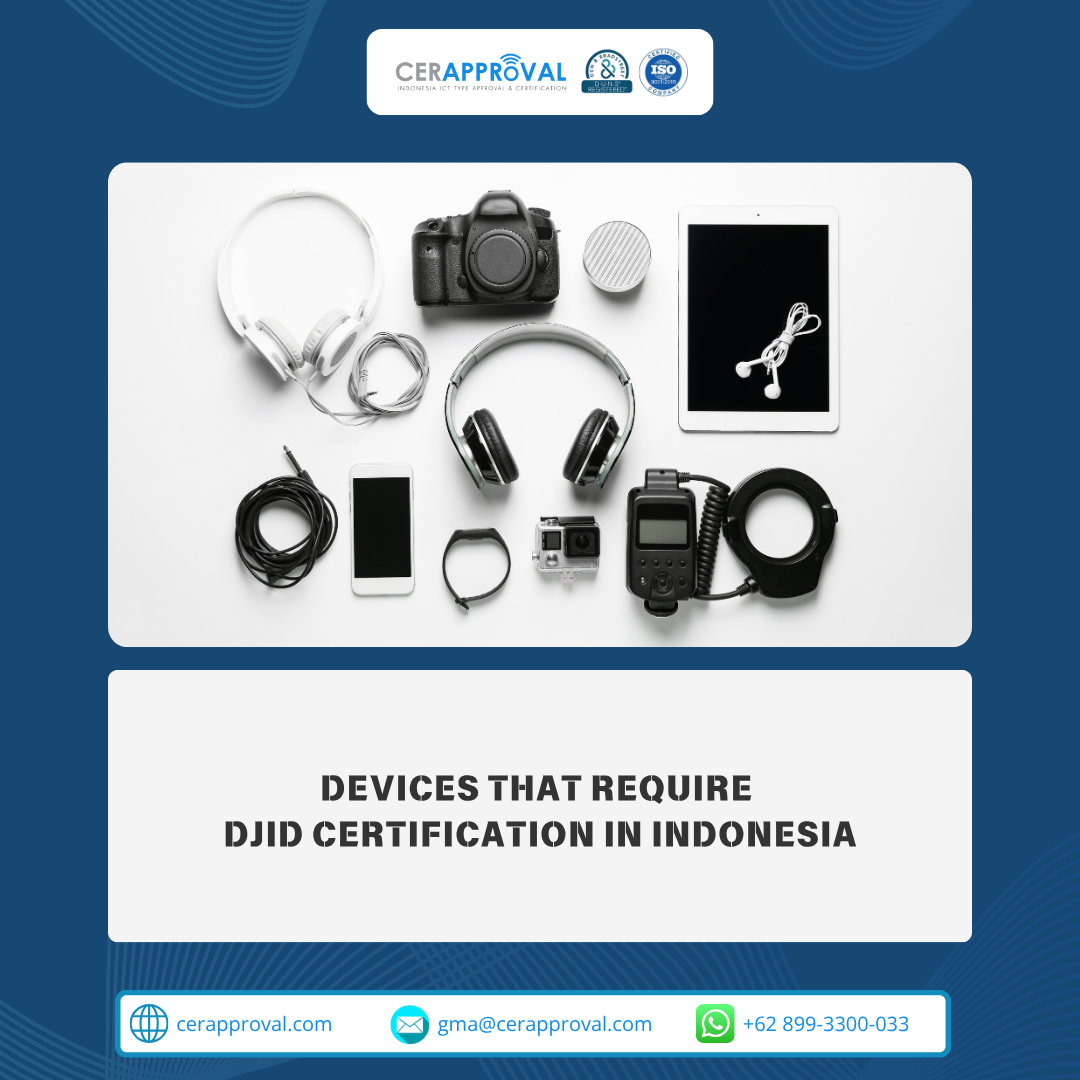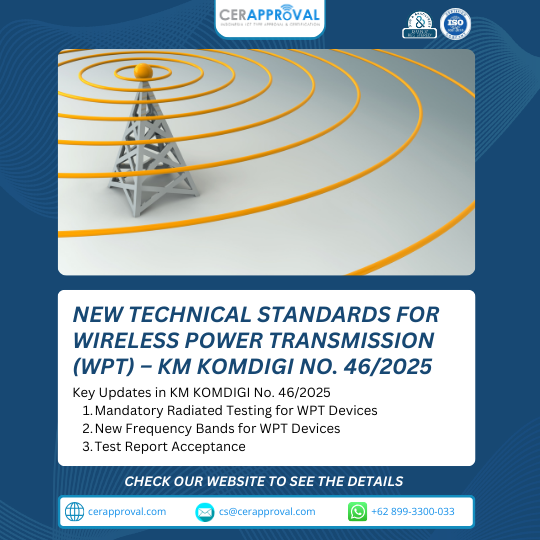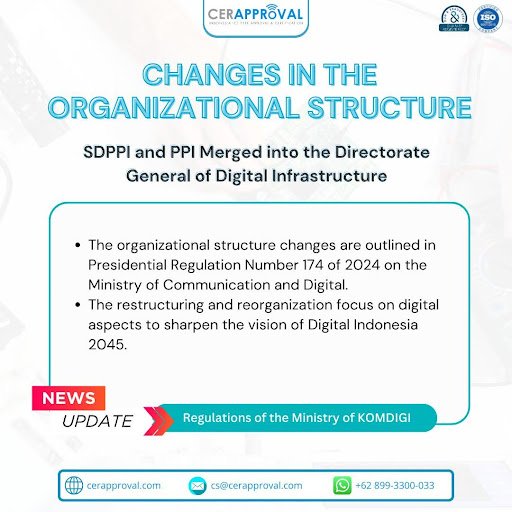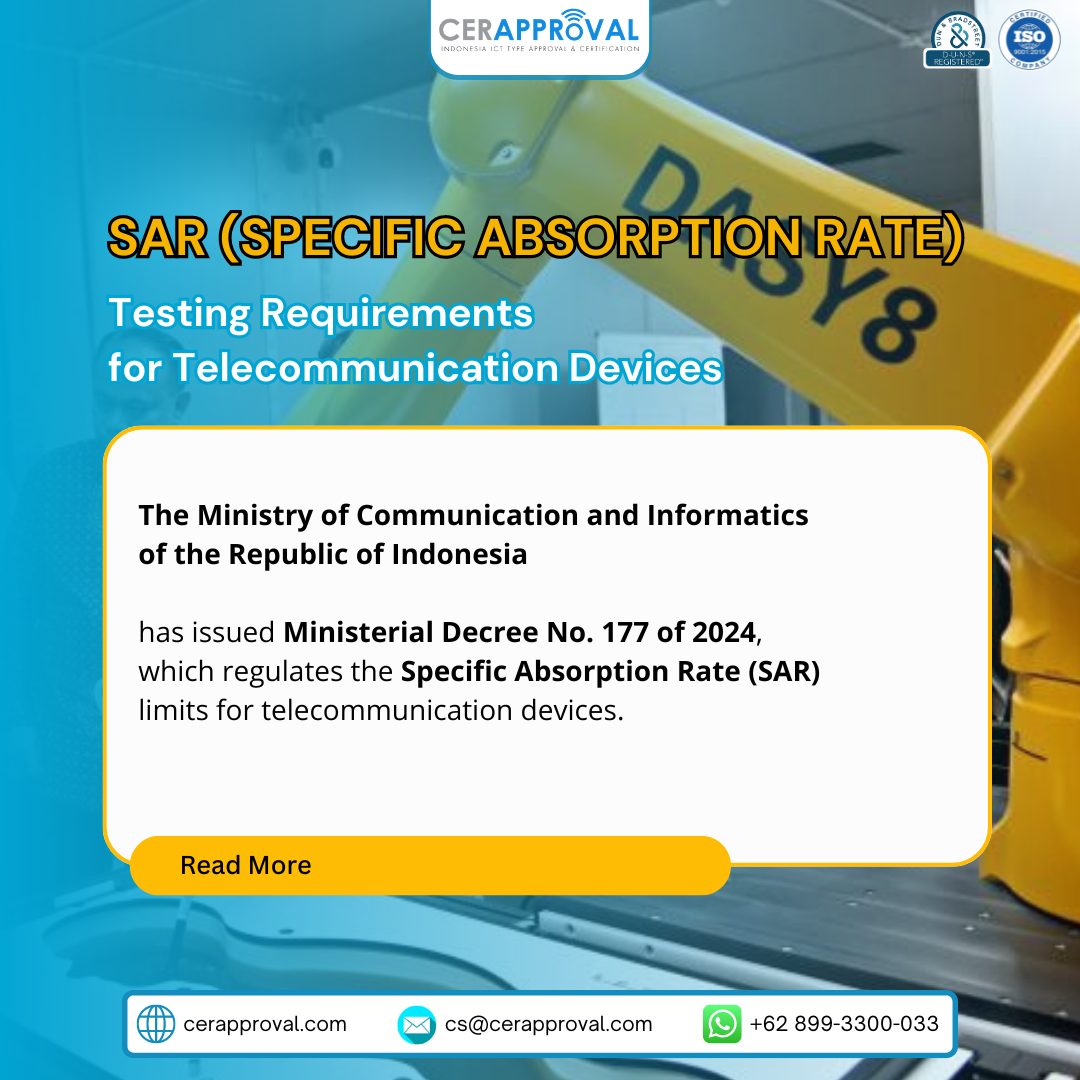-

Devices That Require DJID Certification in Indonesia
Devices That Require DJID Certification in Indonesia If you are planning to import, distribute, or sell wireless or telecom devices in Indonesia, you must ensure they are certified by DJID (formerly SDPPI) under the Ministry of Communication and Digital (Komdigi). What is DJID/SDPPI Certification? DJID certification is a mandatory technical and regulatory approval for any device using radio frequency (RF). This ensures that the device complies with local technical standards and does not interfere with licensed frequencies. Common Devices That Require Certification 🔹 Bluetooth Devices – TWS earbuds, wireless headsets, smartwatches, wireless printers. 🔹 Wi-Fi / RLAN Devices – Access
-

SDPPI Postel (DJID) Certification for Automotive Head Units in Indonesia: Complete 2025 Guide
Modern car head units are no longer just radios. Most now come equipped with Bluetooth, Wi-Fi, GPS, and even 4G/5G connectivity. In Indonesia, any head unit with wireless features must obtain a certification from SDPPI/DJID, issued by the Ministry of Communication and Digital (KOMDIGI). What is SDPPI Postel (DJID) Certification? This certification is issued by the Directorate General of Digital Infrastructure (DJID)—previously known as SDPPI. It ensures that all wireless-capable telecommunication devices, including automotive head units, comply with Indonesian national technical standards. Why Do Automotive Head Units Need Certification? Because these devices transmit radio signals, they are classified as telecommunication
-

How to Get SDPPI Postel DJID Certification for RLAN Devices (2.4/5/6 GHz) in Indonesia
in 2025, all applications for SDPPI Postel certification under DJID KOMDIGI must include a Firmware Declaration Letter and a Declaration of Conformity Letter to certify RLAN devices (such as Access Points, Wireless Routers, etc.) operating on 2.4 GHz, 5 GHz, and 6 GHz. This new regulation is essential for manufacturers, importers, and distributors who want to legally sell Wi-Fi devices in Indonesia. Firmware/Software Compliance Requirements for RLAN Devices Devices operating on 2.4 GHz, 5 GHz, and 6 GHz bands must comply with these firmware and software requirements: 1. Country Code Lock The firmware must not allow users to change the
-

New Technical Standards for Wireless Power Transmission (WPT) – KM KOMDIGI No. 46/2025
The Indonesian Ministry of Communication and Digital (KOMDIGI) has issued Ministerial Decree No. 46 of 2025, which sets new technical standards for Wireless Power Transmission (WPT) devices. This regulation replaces KM 260/2024 and took effect on February 18, 2025. Key Updates in KM KOMDIGI No. 46/2025 Mandatory Radiated Testing for WPT Devices All Wireless Power Transmission (WPT) devices are now required to undergo radiated testing to ensure compliance with the latest technical standards. New Frequency Bands for WPT Devices The regulation introduces three additional frequency bands for Wireless Power Transmission (WPT): 🔹 315-405 kHz 🔹 1700-1800 kHz 🔹 13.553-13.567 MHz
-

SDPPI and PPI Merged into the Directorate General of Digital Infrastructure
The Indonesian government has introduced a major restructuring, the Directorate of SDPPI and the Directorate PPI are now Merged into the Directorate General of Digital Infrastructure. Under the new framework, the Directorate General of Resources and Equipment of Post and Informatics (SDPPI) and the Directorate of Post and Informatics (PPI) are now consolidated into the Directorate General of Digital Infrastructure. This change is part of Indonesia’s broader strategy to enhance digital transformation and is detailed in Presidential Regulation No. 174 of 2024 on the Ministry of Communication and Digital (Komdigi). Merging PPI and SDPPI into Digital Infrastructure As part
-

SAR Testing Requirements for Telecommunication Devices
The Ministry of Communication and Informatics of the Republic of Indonesia has issued Ministerial Decree No. 177 of 2024, which regulates the Specific Absorption Rate (SAR) limits for telecommunication devices. This regulation applies to mobile phones and tablet computers used in Indonesia. What is the Specific Absorption Rate (SAR)? Specific Absorption Rate (SAR) measures the amount of electromagnetic radiation absorbed by the human body when using telecommunication devices. This testing aims to ensure that these devices are safe and do not negatively impact the health of users. Regulation Update Ministerial Decree No. 177 of 2024 establishes new standards for SAR,
-
Radio Frequency Spectrum Violation Penalty
This socialization discusses administrative penalty sanctions for the improper use of radio frequencies in Indonesia. There are several regulations that can serve as references for operators of telecommunication devices in carrying out their operations, including: 3 Types of Radio Frequency Spectrum/Telecommunication Device Violations The imposition of administrative fines for violations of Radio Frequency Spectrum/Telecommunication Device misuse is classified into 3 types: The formula for calculating fines for SFR/APT misuse based on Presidential Regulation No. 43 of 2023 Articles 20-21 is as follows: FINE = VIOLATION POINTS x ADMINISTRATIVE FINE RATE Violation Points = Violation Index x Maximum Points x
-

ANTENNAS ARE NOW REQUIRED TO BE CERTIFIED
On December 18 2023, the Minister of Communication and Information has established new regulations regarding Technical Standards for Antenna Telecommunications Equipment in KEPMEN KOMINFO Number 601 of 2023. Therefore, antennas are now required to have type approval certification.
-

SDPPI OBLIGES FULL PARAMETER EMC TESTING
As of January 1, 2024 SDPPI requires full parameter EMC testing, conducted and radiated. This full parameter EMC testing not only applies to devices powered by AC power, but also applies to devices powered by DC Power that have a charger.
-

BBPPT is Ready to Implement Electrical Safety Testing
Directorate General of Resources and Postal and Information Technology Devices (Dirjen SDPPI) number 5498/BBPPT.31/SP.05.01/09/2023, the Telecommunication Device Testing Center (BBPPT) can carry out Laser Safety testing.


The Wayang Office Plaza, 5th Floor
Jl. Kedondong No. 5A, RT.11/RW.9
Rawamangun, Pulo Gadung
East Jakarta, DKI Jakarta 13220
Indonesia

Telp: +6221 388-590-01
WhatsApp: +62 899-3300-033
WhatsApp SNI: +62 857-7042-1713

Opening : Mon – Fri, 8:00 – 16:00
Tag: #SDPPICertification
Ready To Start New Project With Intrace?
Lorem ipsum dolor sit amet, consectetur adipiscing elit, sed do eiusmod tempor incididunt ut labore et dolore magna aliqua.
